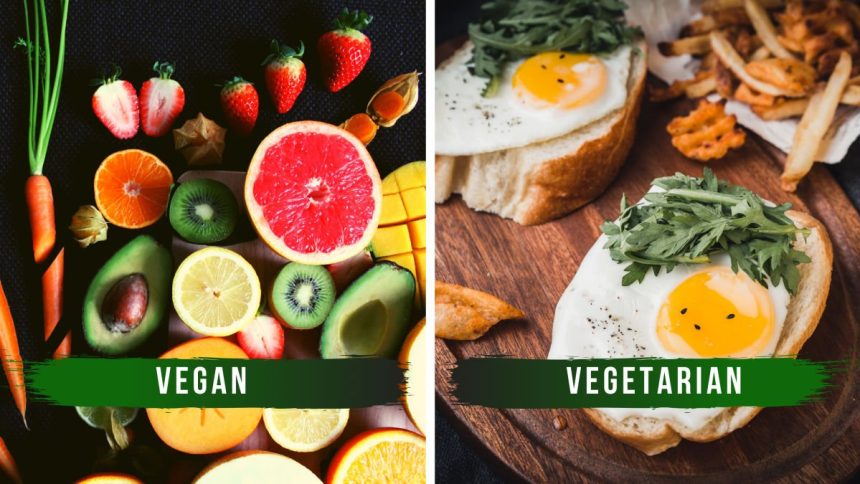There are some general guidelines for what constitutes a healthy diet: lots of veggies, occasional sweet treats, healthy fats and fiber, and a few other catchphrases. However, the question of where meat and dairy fit into the maze remains. Is it okay to eat meat and cheese as part of a “better and healthier” meal, or is vegan only one method of eating when it concerns one’s physical health?
Is it likely that a vegetarian who eats oily vegetarian burgers with french fries each day for lunch will be healthier compared to someone who every time orders grilled fish? Certainly not!
What is a vegetarian diet?
First and foremost, what exactly is a “vegetarian”? A vegan is a person who does not ingest any meat, chicken, fish, raw fish, or animal slaughter by-products. Vegetarian diets differ in their proportions of fruit, veggies, grain products, lentils, nuts, and seeds. The amount of milk, honey, and eggs you consume is determined by your diet. Normally there are four types of vegetarian diets.
- lacto-ovo: The majority of people follows lacto-ovo diet. They ingest only non-animal products, but they do ingest products derived from animals like cottage cheese and eggs.
- strict vegan: Vegans does not ingest any animal products, and as an outcome, they should be extremely careful in their food selection to ensure that their bodies receive all of the essential minerals they require.
- Pesco-pollo: These types of vegetarians eat fish, shellfish, and chicken in addition to all the plant-based foods.
- Flexitarians: They contain a plant-based diet but sometimes eat meat and dairy. They have reduced the quantity of animal-based products but haven’t eliminated it completely.
What is a Vegan diet?
The vegan diet is the most strict form of vegetarianism. Veganism is currently stated by the Vegan Community as a way of life that strives to ignore all forms of animal enslavement and brutality in any way possible. As a result, a vegan diet not only excludes mammal meat but also milk, eggs, and other products derived from animals. These are some examples: gelatine, honey, carmine, pepsin, shellac, albumin, whey casein, and some types of vitamin D3.
Now that we have identified the types, we will attempt to resolve this centuries-old debate.
Where vegans reign supreme
Some of the health benefits of a vegan diet are as follows:
- Improved Heart Health: Several surveys have found that people who follow a vegan diet have lower cholesterol levels than those who eat meat. In other words, a vegan diet promotes better heart health and, as a result, lowers the risk of heart disease.
- Blood sugar levels: Vegans have lower blood glucose levels than meat eaters. At first glance, this may appear strange, given that glucose is a carbohydrate and the non-veg diet primarily consists of proteins and fats. So, how is this possible? There is a type of iron that is only found in non-vegan diets that may contribute to raising glucose levels in non-vegetarians.
Fruit, veggies, wheat, beans, peas, lentils, and nuts are the staples of a plant-based diet. It’s high in fiber, vitamins, and minerals. Vegetarians, or people who do not eat meat, consume fewer calories and fat. They also tend to be lighter and are also less likely to develop heart disease than non-vegetarians.
Where meat eaters are better
- Iron levels: According to one study, meat eaters have higher levels of iron in their bodies because seafood and meat have higher levels of haemoglobin and haematocrit. Furthermore, iron from animal-based products is more easily absorbed by our bodies than iron from plants. Furthermore, meat eaters have higher ferritin levels.
- Sex hormones: SHBG levels can be abnormally low, which indicates there are more unreacted sex hormones available for use, or abnormally raised that means fewer unreacted sex hormones are available. Raised SHBG levels can be caused by low-protein diets, which can lead to reduced testosterone bioactivity and harmful impacts on sexual function, fertility, and bone density, as well as an increased risk of certain cancers. Low SHBG, on the other hand, is linked to obesity, diabetes, hypertension, and hypothyroidism.
It is recommended to consume a range of proteins. Egg whites, low-fat dairy and products produced from it, chickpeas, legumes, cereals, soy, and unflavoured nuts and seeds are examples.
Which is healthier: Vegan or non-vegan diet?
According to a survey, as long as the diet is well planned, vegan and non-vegan diet plans can really be considered acceptable for all stages of life. Inadequate nutrient intakes, like a lack of omega-3 fatty acids, calcium, and Vit D and B12, can have a negative effect on numerous facets of health, including mental and physical health. These nutrients may be deficient in both vegans and non-vegans. According to studies, vegetarians ingest a little more calcium and vitamin B12 than non-vegans.
However, both people who are vegetarians and vegan should be attentive to nutrition strategies that increase nutrient absorption from plant-based foods. To consume closely guarded foods and supplements may even be necessary.
Vegans and vegetarians should consider the following tips:
- examining their daily nutrient intake
- having the amount of nutrients in their blood measured
- using supplements as necessary
Both diets are generally considered to be healthy eating options. However, if not pre planned, a vegan diet can result in nutrient deficiencies.
Conclusion
To summarise, the argument regarding if a vegan diet is any better than meat and dairy-based diet is complex, as both the diets have their own advantages and disadvantages. Whereas a survey indicates that a vegan diet that comprises of no animal-based products may provide specific health benefits, it is important to keep in mind that dietary choices can have a wide range of effects on the environment and also on one’s health. Finally, we can say that the right method is one which is predicated on a comprehensive understanding of the subject and takes individual needs into account. Whether one chooses a vegan or vegetarian diet, it is important to prioritize nutrient-dense whole foods and to keep striving for balance and variety in food choices.
About Author
The content is written by Shaheera. She has been writing health articles for the past three years.














